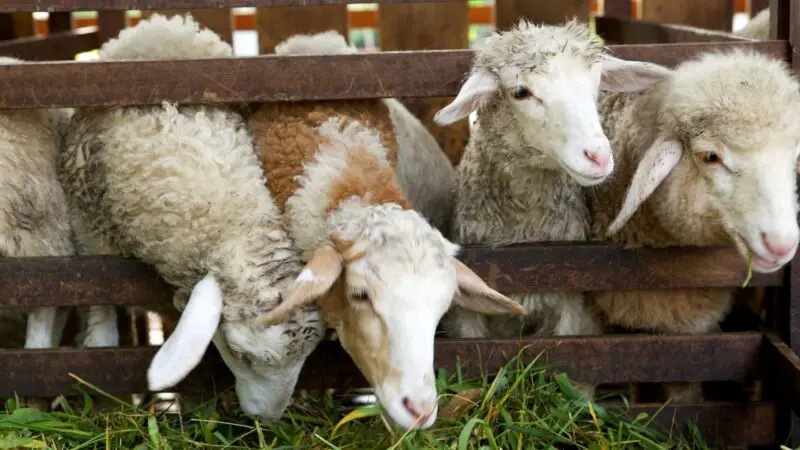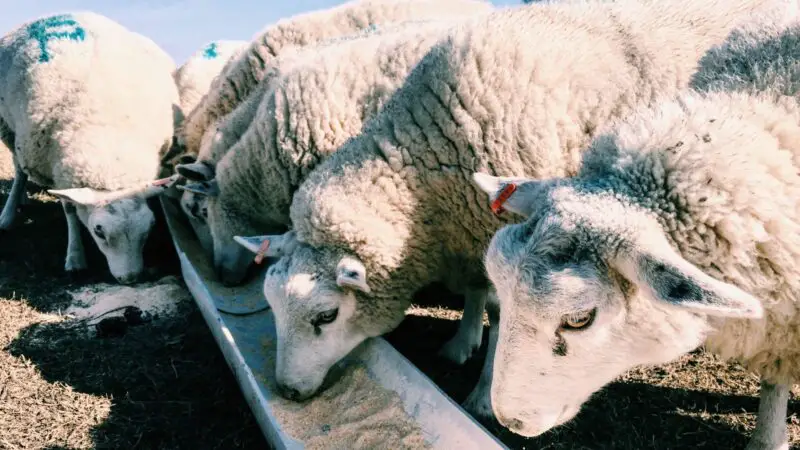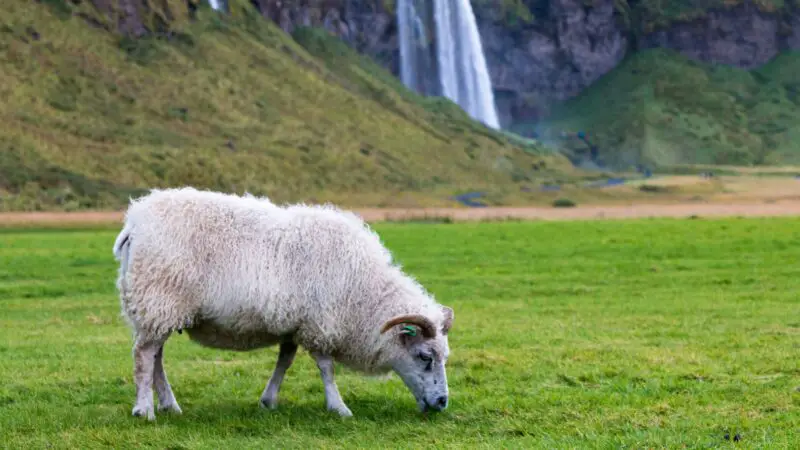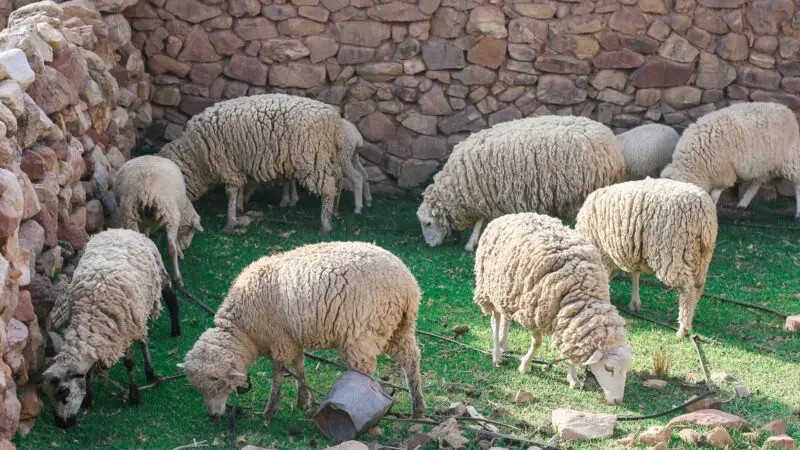As a seasoned farmer and livestock enthusiast, I understand the importance of proper nutrition for the well-being of your sheep. In this comprehensive guide, we’ll dive deep into the world of sheep diet, food, and supplements to ensure your flock thrives.
Providing the right diet, food, and supplements for your sheep is essential to their overall health, growth, and productivity. A balanced diet ensures that your sheep stay healthy and produce high-quality wool and meat.
Keep reading to learn more about the best practices, essential nutrients, and dietary recommendations for your sheep. You’ll also discover helpful tips on pasture management, social recommendations, and common health challenges faced by sheep.

What Do Sheep Need?
Sheep have specific dietary requirements to maintain their health and productivity. They need a balance of carbohydrates, fats, proteins, vitamins, and minerals. As ruminant animals, they rely on a diet of mainly forage, including grasses, legumes, and hay. Providing clean water and access to salt and mineral blocks is also crucial for their well-being.
Daily Health Care for Sheep
Daily health care for sheep includes:
- Monitoring their appetite and water intake
- Observing their behavior and physical condition
- Checking for signs of illness or injury
- Providing fresh, clean water
- Rotating pasture to prevent overgrazing
- Ensuring access to salt and mineral blocks
Food and Nutritional Recommendations for Sheep
What Is the Best Diet for Sheep?
The best diet for sheep includes a variety of forages, such as grasses, legumes, and hay. Sheep should also have access to fresh water and salt and mineral blocks. In some cases, supplementing their diet with grain, such as corn, barley, or oats, may be necessary to meet their energy and protein requirements.
Related: 6 Best Hay Feeder for Goats and Sheep | Check Before Buying
What Are the Most Important Nutrients for Sheep?
The most important nutrients for sheep include:
- Protein: Essential for growth, reproduction, and wool production
- Energy: Provided by carbohydrates and fats for maintenance, growth, and lactation
- Fiber: Necessary for proper rumen function and digestion
- Vitamins and minerals: Essential for various bodily functions and overall health
What Protein Do Sheep Need?
Sheep require different amounts of protein depending on their age, sex, and stage of production. For example, growing lambs need higher levels of protein than adult ewes. A balanced diet of forage, such as grasses and legumes, should provide sufficient protein for most sheep. However, supplementation may be necessary in some cases.
What Grain Is Best for Sheep?

The best grains for sheep include corn, barley, and oats. These grains provide energy and can be used to supplement their diet, especially during periods of high nutritional demand, such as pregnancy or lactation. Be cautious when introducing grains to their diet, as overfeeding can lead to digestive problems.
What Grass Can Sheep Eat?
Sheep can graze on a variety of grasses, including:
- Bermuda grass
- Orchardgrass
- Fescue
- Ryegrass
- Timothy grass
- Bluegrass
Rotating pasture and providing a mix of grass species promotes better forage quality and helps prevent overgrazing.
What Fruits and Vegetables Can Sheep Eat?
Sheep can enjoy a variety of fruits and vegetables, such as:
- Apples
- Pears
- Carrots
- Turnips
- Beets
- Pumpkins
These treats provide additional nutrients and variety in their diet. However, be cautious when feeding large amounts of fruits and vegetables, as it may cause digestive problems.
What Human Food Can Sheep Eat?
Sheep can safely consume some human foods, including bread, rice, and pasta in moderation. However, it is essential to ensure that these foods do not contain any harmful additives, seasonings, or preservatives. Keep in mind that human food should only be given as occasional treats and not as a primary source of nutrition for your sheep.
Do Sheep Need a Pasture?
Yes, sheep need a pasture to graze, roam, and exhibit their natural behaviors. Pasture-based diets are ideal for sheep, as they provide fresh forage, exercise, and mental stimulation. Providing a well-managed pasture also helps maintain the health of your sheep by minimizing the risk of parasites and diseases.
Social Recommendations for Sheep
Sheep are social animals and thrive in a flock. Keeping them in groups promotes their mental well-being, reduces stress, and encourages natural behaviors. Social interactions among sheep can also help establish a hierarchy and prevent aggression and fighting.
Common Sheep Health Challenges
Some common health challenges faced by sheep include:
- Parasites: Internal parasites, such as worms, and external parasites, like lice and ticks, can cause health issues in sheep.
- Foot problems: Footrot and scald are common issues that can affect sheep’s mobility and overall health.
- Respiratory infections: Pneumonia and other respiratory infections can be detrimental to sheep, especially during periods of stress or extreme weather conditions.
Regular health checks, proper nutrition, and good management practices can help minimize these health challenges.
What Should You Not Feed Sheep?
Avoid feeding your sheep the following:
- Avocado
- Chocolate
- Onion
- Garlic
- Rhubarb
- Uncooked potato
- Moldy or spoiled food
These items can be toxic or harmful to sheep, causing illness or even death.
How Do You Keep Sheep Healthy?
To keep your sheep healthy, follow these guidelines:
- Provide a balanced diet
- Offer clean, fresh water
- Ensure access to salt and mineral blocks
- Monitor their health and behavior
- Keep their living environment clean
- Rotate pasture to prevent overgrazing and parasite buildup
- Practice proper biosecurity measures
- Schedule regular veterinary check-ups and vaccinations

Related Questions
Is Soybean Meal Good for Sheep?
Soybean meal can be a valuable protein supplement for sheep, especially when high-quality forage is limited. However, it should be fed in moderation and as part of a balanced diet.
Can You Feed Sheep Too Much Protein?
Feeding sheep excessive amounts of protein can lead to health issues, such as urinary calculi and kidney damage. Ensure that your sheep receive a balanced diet with appropriate protein levels for their specific needs.
What Is the Cheapest Way to Feed Sheep?
The most cost-effective way to feed sheep is by providing high-quality pasture and forage. Raising your hay and managing your pasture can help reduce feeding costs. Supplement with grains and protein sources when necessary.
Can Sheep Eat Too Much Alfalfa?
While alfalfa is a nutritious and protein-rich forage, feeding excessive amounts can lead to health issues like bloat and urinary calculi in sheep. It is essential to balance alfalfa intake with other forages and monitor their diet carefully.
Will Sheep Stop Eating When They Are Full?
Sheep will generally graze throughout the day and may not stop eating when they are full. It is crucial to provide a balanced diet and monitor their intake to prevent overeating and associated health issues.
How Much Grain Should a Sheep Eat per Day?
The amount of grain a sheep requires depends on their age, size, and nutritional needs. Consult your veterinarian or a livestock nutritionist to determine the appropriate grain supplementation for your sheep.
How Many Times a Day Should You Feed Sheep?
Sheep should have continuous access to forage, either through grazing or hay. If you are supplementing their diet with grain, it can be fed once or twice a day, depending on their nutritional requirements. Monitor your sheep’s condition and adjust their feeding schedule as needed.
How Many Bales of Hay Does a Sheep Need a Day?
The amount of hay a sheep needs per day depends on the size and weight of the animal, as well as its age, reproductive status, and activity level. On average, a mature sheep may consume around 2 to 4% of its body weight in hay daily. To ensure adequate nutrition, always provide ample hay and adjust the amount based on your sheep’s needs.

Final Thoughts
Providing the right diet, food, and supplements for your sheep is crucial to their health, growth, and productivity. A balanced diet, proper management practices, and regular health monitoring can ensure your sheep thrive and remain healthy. Remember to consult with your veterinarian or a livestock nutritionist when making dietary adjustments to ensure the best outcome for your flock.
